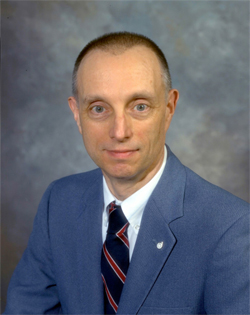Dennis M. Bushnell, M.S.
Dennis M. Bushnell, M.S., FASME, FAIAA, FRAS is Chief Scientist, NASA Langley Research Center.
Dennis is responsible for technical oversight and advanced program formulation with emphasis in the areas of atmospheric sciences and structures, materials, acoustics, flight electronics/control/software, instruments, aerodynamics, aerothermodynamics, hypersonic airbreathing propulsion, computational sciences, and systems optimization for aeronautics, spacecraft, exploration, and space access.
During his 43-year career, he has authored 247 publications/major presentations and 280 invited lectures/seminars, and invented five patents. His technical specialties include flow modeling and control across the speed range, advanced configuration aeronautics, aeronautical facilities and hypersonic airbreathing propulsion. He is a member of the National Academy of Engineering and Fellow of ASME, AIAA, and the Royal Aeronautical Society. He holds numerous awards and distinctions from governmental agencies, professional societies and academia, and has served numerous national and international organizations as consultant or committee member. He has served as reviewer and editor for 40 journals and organizations.
Dennis developed the “riblet” approach to turbulent drag reduction, high speed “quiet tunnels” for flight-applicable boundary layer transition research, advanced computational approaches for laminar flow control and advanced hypervelocity airbreathing and aeronautical concepts with revolutionary performance potential. He served the Gemini, Apollo, Viking, F-18E/F (patent holder for the “fix” to the wing drop problem) and Shuttle programs.
Dennis authored Application frontiers of “designer fluid mechanics” — Visions versus reality or an attempt to answer the perennial question “why isn’t it used?”, SCALING: Wind Tunnel to Flight, Hypersonic Flight Experimentation – Status and Shortfalls, and Civilian Aeronautical Futures — The Responsibly Imaginable, coauthored Effect of compliant wall motion on turbulent boundary layers, Separation control – Review, Numerical computations of turbulence amplification in shock wave interactions, Facility opportunities and associated stream chemistry considerations for hypersonic air-breathing propulsion, and Power-law Velocity-Profile-Exponent Variations with Reynolds Number, Wall Cooling, and Mach Number in a Turbulent Boundary Layer, and coedited Viscous Drag Reduction in Boundary Layers.
His patents include Serrated trailing edges for improving lift and drag characteristics of lifting surfaces, Polymer/riblet combination for hydrodynamic skin friction reduction, Channel-wing system for thrust deflection and force/moment generation, and Powder fed sheared dispersal particle generator.
Dennis earned a BS with Highest Honors in mechanical engineering from the University of Connecticut in 1963 and an MS in mechanical engineering from the University of Virginia in 1967. He won the Lawrence A. Sperry Award in 1975 and also has won the AIAA Fluid and Plasma Dynamics Award, the AIAA Dryden Lectureship, and is the recipient of many NASA Medals for outstanding Scientific Achievement and Leadership.
Listen to Dennis on a C-Realm Podcast. Read Leading Thinkers and Scientists on Energy – Dennis M. Bushnell, NASA Chief Scientist and Interview with Dennis M. Bushnell. Read his LinkedIn profile.
